The manic episode may have been preceded by and may be followed by hypomanic or major depressive episodes. Bipolar disorder is a mood disorder.
Antibiomania After Triple Therapy For Helicobacter Pylori Two Case Reports And A Review Of Physiopathology
Bipolar Disorder with Psychotic Features Some people who have been diagnosed with bipolar disorder will experience episodes of psychosis during mania or depression.
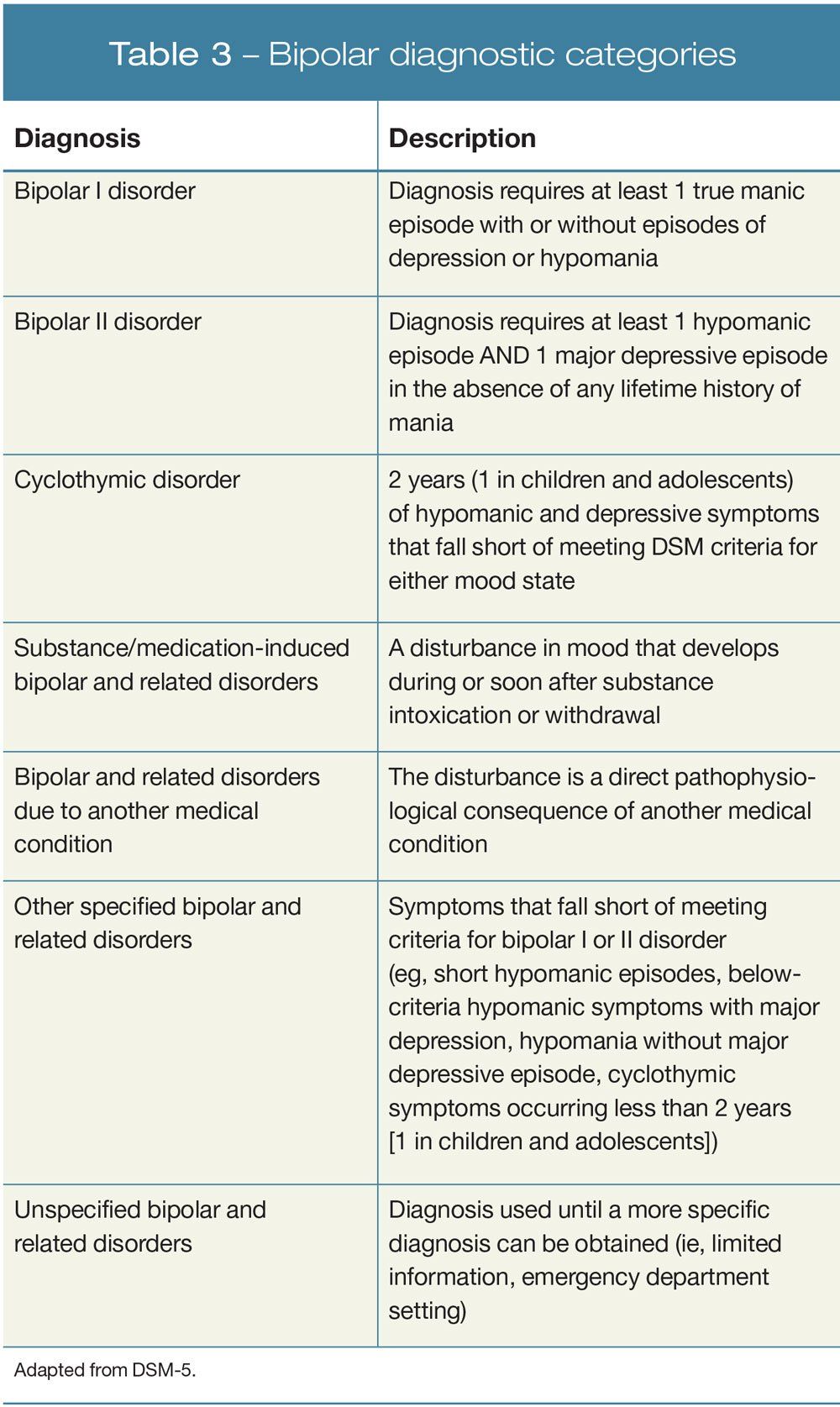
Bipolar disorder with psychotic features. This means symptoms are. Treating people with bipolar disorder can prove a challenge. We say that in bipolar disorder the person can have psychotic symptoms during the peaks of mania or the depths of depression Descartes Li MD clinical professor in the department of.
Psychosis refers to a disconnected view of. Individuals who have mood-congruent psychosis will have hallucinations and delusions that are consistent with their current mood. Bipolar disorder with psychotic features In bipolar disorder with psychotic features you experiences delusions or hallucinations which might be auditory or visual.
A total of 4724 subjects with major mood disorder in three family studies on the genetics of bipolar I disorder BPI or recurrent major depressive disorder MDDR were administered semi-structured interviews by clinicians. These episodes cause hallucinations delusions disordered thinking and a lack of awareness of reality. As I have been experiencing psychotic symptoms for as long as I can remember and the fact that bipolar disorder is a lifelong condition I remember feeling incredibly daunted and depressed at the fact that most likely I will be experiencing delusions hallucinations and.
Bipolar with psychotic features is a mental health diagnosis defined by alternating periods of depression and mania accentuated by episodes of psychosis. One problem is that people experiencing a manic episode may not want treatment. Some physical health conditions such as thyroid disease can mimic the moods and other symptoms of bipolar disorder.
A person with bipolar disorder experiences alternating highs what clinicians call mania and lows also known as depression. Both the manic and depressive periods can be brief from just a. Mood disorder secondary to a general medical condition.
Such conditions like schizophrenia or delusional disorders are diagnosed solely on the presence of these symptoms. F A distinct period of abnormally and persistently elevated expansive or irritable mood and abnormally. Mood congruent and mood incongruent.
Example some people with bipolar disorder who also have psychotic symptoms can be misdiagnosed with schizophrenia. They may see their mania as a positive especially when compared to the pain of depression. Bipolar 1 disorder with psychotic features is best treated with a combination of medication and talk therapy.
Psychotic features are symptoms that can be present in certain mental illnesses. We hypothesized that groups of psychotic symptoms Schneiderian mood incongruent thought disorder delusions and hallucinations have. Bipolar affective disorder manic episode with psychotic features.
Bipolar disorder also known as manic depression can prove disruptive to ones life if appropriate treatment is not sought. Heres a simple definition you can use if someone asks you the question. Bipolar disorder is a mood disorder that features extreme shifts in mood during which psychosis can occur.
Psychotic features such as hallucinations may accompany depression or bipolar disorder. There are two types or features of psychosis in people with bipolar disorder. In a large and comprehensively assessed sample of patients with bipolar disorder type I BDI we investigated the prevalence of psychotic features and their relationship with life course demographic clinical and cognitive characteristics.
He was started on risperidone at 1 mg once daily as an antipsychotic and moodstabilizing agent under the impression of a manic episode and a decision was made to admit him to an inpatient psychiatry ward for further management. Bipolar Disorder with Psychotic Features. Determination of psychotic features was based on a report of hallucinations andor delusions during the most severe depressive episode in the Schedule for.
Bipolar 1 disorder with mood-congruent psychotic features Around 50 of patients with bipolar 1 disorder will exhibit mood-congruent psychotic features. What is the difference between bipolar disorder psychosis and the psychosis that leads to a schizo-affective diagnosis. For a diagnosis of bipolar I disorder it is necessary to meet the following criteria for a manic episode.
Bipolar disorder also known by its older name manic depression is a mental disorder that is characterized by constantly changing moods. I have repeated myself a bit in this article as I too find the question a bit complicated. Bipolar Disorders biPolar i disorder.
Bipolar Disorder With Psychotic Features or Schizo-Affective Disorder.
I have a dual diagnosis as bipolar 2 and borderline personality disorder. Borderline on the other hand can go away with lots of counseling to alter my thought process.
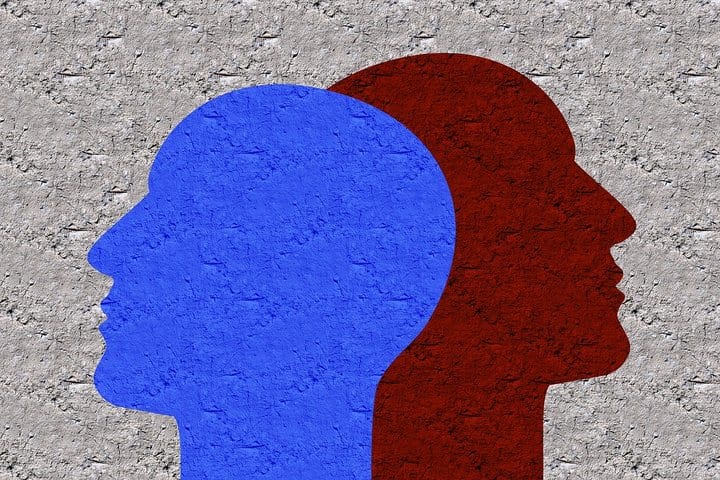 Dual Disorders My Experience With Bipolar And Borderline Personality Disorders International Bipolar Foundation
Dual Disorders My Experience With Bipolar And Borderline Personality Disorders International Bipolar Foundation
The affective instability in borderline personality disorder does not resemble classical bipolar disorders and can be distinguished from hypomania.
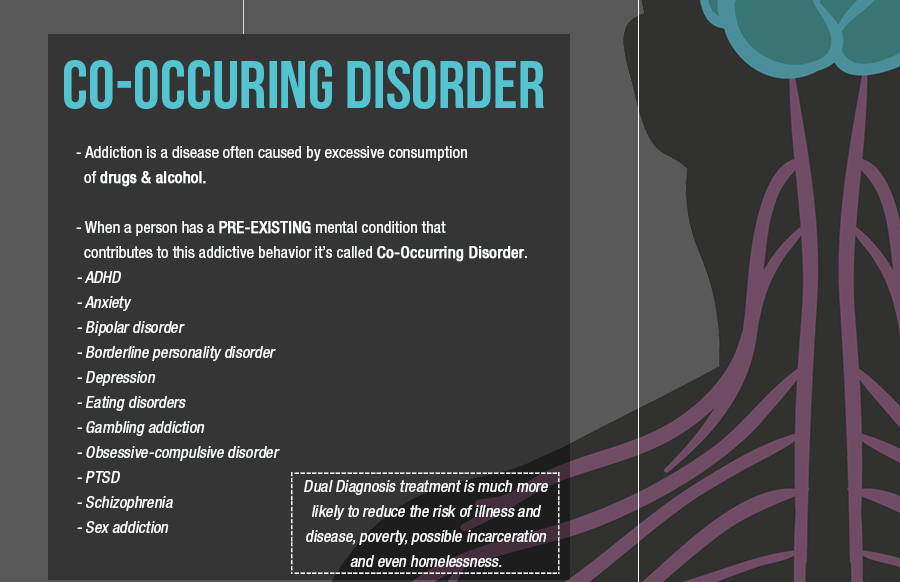
Bipolar and borderline personality disorder dual diagnosis. Curr Psychiatry Rep 2112125 20 Nov 2019 Cited by. The first major distinction between these diagnoses is that bipolar is a primary disorder of mood and borderline is a primary disorder of personality involving longstanding interpersonal. Whats the Difference Between Borderline Personality Disorder and Bipolar Disorder.
This makes it more difficult to detect BPD symptoms. Some days are better than others. Impact of Borderline Personality Disorder on Bipolar Disorder.
While bipolar disorder and BPD do share similar symptoms the majority of symptoms dont overlap. Bipolar disorder is often diagnosed first because symptoms can change. Borderline personality disorder Borderline personality disorder is a complex diagnosis characterized by mood instability impulsivity and disturbed relationships.
A signifier of this illness is an extreme instability in relationships self-image and behavior. Bipolar disorder and borderline personality disorder have crossover traits and so a person with bipolar disorder can often mistakenly be diagnosed with borderline personality disorder. This is particularly the case with type 1 bipolar disorder which involves intense manic episodes.
Thats because the symptoms of one disorder can overlap and sometimes mask the. It has been observed that people who get a dual diagnosis generally have a history of substance abuse and may have had symptoms of ADHD in their childhood. Some days I am on top of the world and some days I cant get out of bed.
Most people who have a dual diagnosis of bipolar disorder and BPD receive one diagnosis before the other. This is particularly true because borderline personality disorder or BPD is associated with addiction risk. People diagnosed with both the conditions tend to have a worse course of illness.
I am on 300mg of Lithium and 25mg of Lamictal and tapering up. Thats because the symptoms of one disorder can overlap and sometimes mask the other. Many of the symptoms of bipolar disorder and borderline personality disorder overlap.
Similar to some symptoms of bipolar disorder or anxiety persons with borderline personality disorder often have intense mood swings frequently mixed with paranoia. Bayes A Parker G Paris J. But as much stigma as there is attached to having bipolar there is even more stigma attached to having borderline.
The key difference between bipolar disorder and borderline personality disorder is that bipolar disorder is a mood disorder and borderline personality disorder as its name implies is a. Differential Diagnosis of Bipolar II Disorder and Borderline Personality Disorder. They are frequently comorbid disorders.
A recent review from Canada found substantial overlap between borderline and bipolar disorder diagnoses though still concluded that borderline deserved to be regarded as a valid diagnosis separate from bipolar disorder. Magill This is an excellent review of this overlap or one illness issue and I rather agree with the conclusion. Borderline personality disorder BPD on the other hand is a personality disorder marked by instability in behaviors functioning mood and self-image.
I want to tell you about being diagnosed with borderline personality disorder in addition to bipolar disorder. It is unclear whether an accurate dual diagnosis with both bipolar disorder and borderline personality disorder is possible. Researchers arent sure what causes bipolar disorder.
Most people who have a dual diagnosis of bipolar disorder and BPD receive one diagnosis before the other. Its not uncommon to have both. Bipolar and borderline personality disorder dual diagnosis is another area to be aware of especially for people coping with a dual diagnosis.
I lean more towards depression but have had bouts of extreme anxiety daily suicidal thinking anger and risky sexual behavior. Some studies have shown that about 10 of people with a borderline personality disorder also have had bipolar I disorder and 10 have bipolar II disorder. In fact some feel that diagnosis with both disorders is inappropriate unless.
Bipolar II is hypomanic states to depression going back and forth like a roller coaster.
Treatment for schizoid personality disorder will focus on psychotherapy. No medications are indicated for directly treating schizoid personality disorder but certain medications may reduce the symptoms of SPD as well as treat co-occurring mental disorders.
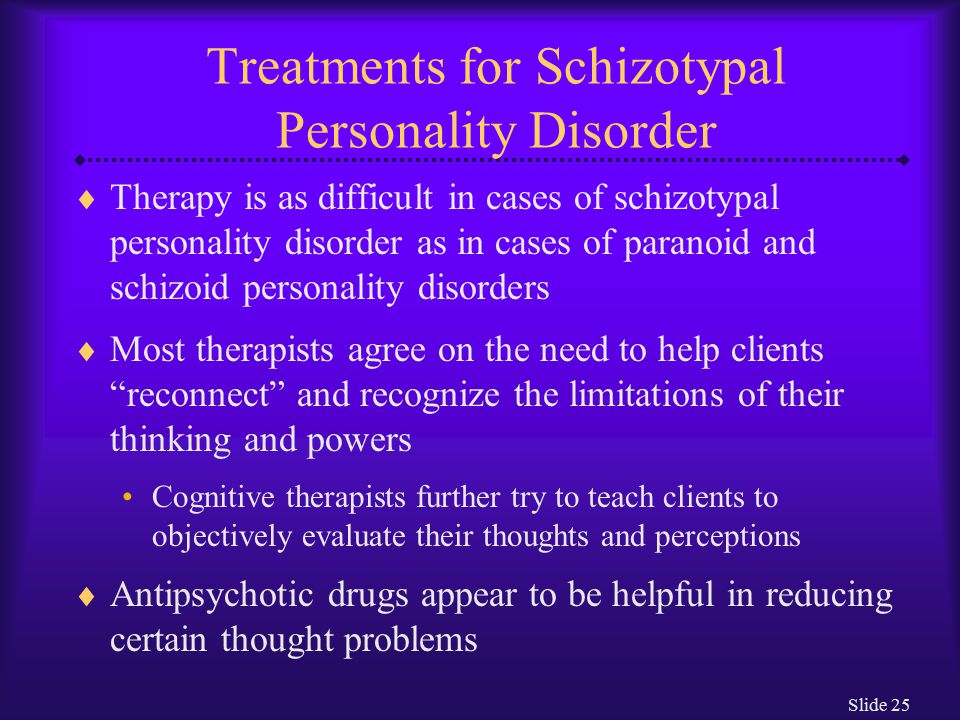 Personality Disorders Ppt Download
Personality Disorders Ppt Download
Cluster B consists of borderline narcissistic histrionic and antisocial personality disorders.
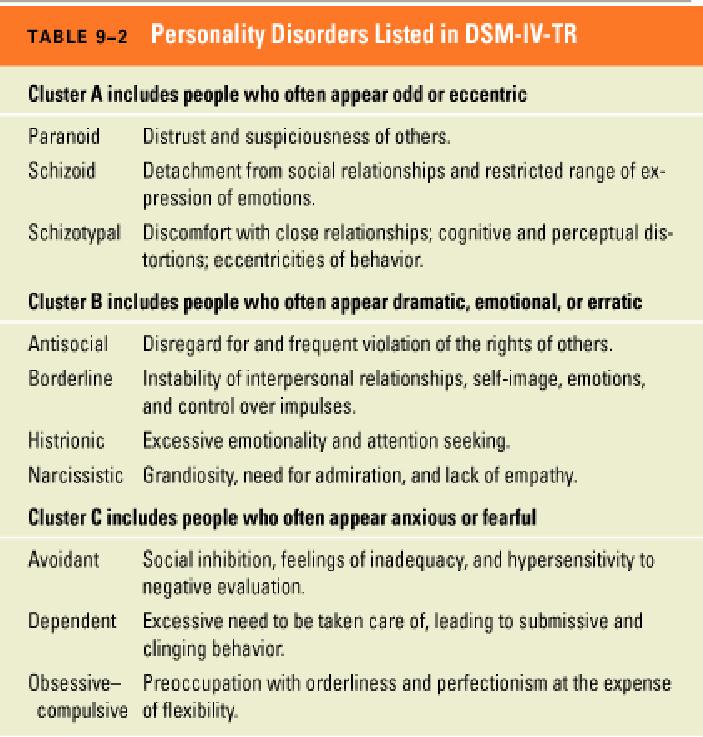
Treatment for schizoid personality disorder. Thus getting a proper diagnosis and becoming educated with the tools for managing the disorder may ensure you put. Even if you do not have the emotional desire for pleasure or attachment now that will undoubtedly change as you age. About 31 to 49 of the general US population have schizoid personality disorder.
According to the most recent consensus personality disorders are explained as chronic maladaptive behavior patterns that are inflexible pervasive and lead to social isolation and distress. The CBT approach is usually short-term with a goal of helping the individual develop authentic friendships and interpersonal bonds. Schizoid disorder case studies indicate that other borderline personality disorders like schizotypal or schizoaffective disorders can coexist with schizoid disorder.
Treatment options for schizoid personality disorder include approaches to psychotherapy and help clients to patiently orient to personal connections in the ways that are meaningful to them. If you or someone you care about believes the signs and symptoms of a schizoid personality disorder sound familiar it may be time to seek professional treatment. However medications may be used to treat other conditions that occur along with.
Living with schizoid personality disorder involves disconnection emptiness and. Medications are not usually recommended for schizoid personality disorder. If the individual has a co-occurring mental health condition such as depression then antidepressants would be included.
Through therapy sessions the individual will work on learning new ways to improve their social skills communication skills and better coping skills. The top drugs used in schizoid personality disorder treatment are. This is a systematic evaluation of diagnostic instruments and treatment studies in schizotypal personality disorder.
Medication is generally not part of the treatment picture for this disorder. Toward the DSM-V Chapter 4 Schizoid personality disorder toc Introduction Schizoid personality disorder SCPD is distinguished from the other two personality disorders in the oddeccentric cluster by the prominence of social interpersonal and affective deficits in the absence of psychotic-like cognitiveperceptual distortions. CBT is a type of psychotherapy that may help people with the condition cope with and adjust their distorted thought patterns.
There are no FDA-approved medications to treat personality disorders. See also Overview of Personality Disorders In schizoid personality disorder the ability to relate to others meaningfully is limited. The most common treatment method for schizoid disorder is psychotherapy.
We conclude that there is currently only limited evidence on which to base treatment decisions in this disorder. Treatment is with cognitive-behavioral therapy. Because of the heterogeneity of the studies and the small sample sizes it is not yet possible to make evidence-based recommendations for treatment.
However they are sometimes used for short-term treatment of extreme anxiety states associated with the disorder. Schizoid personality disorder therapy may include cognitive behavioral therapy CBT. Cluster A includes paranoid schizoid and schizotypal personality disorders.
These disorders are categorized into three groups or clusters namely A B and C.
Halaman
Renew Physical Therapy
Cari Blog Ini
Label
- 1000
- 10000
- 1500
- 2015
- 29th
- 5000
- abdominal
- ablation
- about
- acetaminophen
- acetonide
- aches
- achy
- acid
- acne
- active
- acupressure
- acupuncture
- adaptogenic
- adderall
- adhd
- admitted
- adults
- advil
- affect
- affordable
- after
- aftercare
- aggregation
- aids
- alcohol
- alcoholic
- aleve
- alienation
- allegra
- allergic
- allergies
- allergy
- allowance
- almond
- american
- aminos
- amiodarone
- anemia
- anise
- ankle
- ankles
- announce
- anorexics
- anti
- antibiotics
- anticoagulant
- antidepressants
- antigen
- anxiety
- anything
- aortic
- apathy
- apple
- arizona
- armpit
- arms
- around
- arterial
- artery
- arthritis
- ascending
- asleep
- aspergers
- assaulted
- atorvastatin
- attack
- attacks
- autism
- autoimmune
- average
- avoid
- awake
- away
- azelastine
- babassu
- babies
- baby
- babymoon
- babysit
- back
- bacterial
- bagel
- baking
- baldness
- balls
- banana
- bars
- base
- basil
- bath
- bathe
- bcaa
- beach
- beans
- beat
- beer
- before
- begin
- behind
- being
- belly
- benadryl
- bench
- benefits
- best
- between
- biceps
- bigger
- bile
- biometric
- biopsy
- bipolar
- birth
- bismol
- bite
- bites
- biting
- black
- blackhead
- bladder
- bleach
- bleeding
- blisters
- bloating
- block
- blockage
- blockers
- blood
- blue
- body
- boiled
- bone
- boneless
- bosley
- bourbon
- bowels
- brace
- bracelet
- braces
- brain
- branch
- break
- breakfast
- breakthrough
- breast
- breastfeed
- breastfeeding
- breath
- breathe
- bridge
- broken
- broth
- brown
- bruise
- bruised
- bruises
- brush
- bubble
- buck
- bugs
- building
- bulk
- bump
- bumps
- bunches
- bunion
- burger
- burn
- burner
- burning
- bursts
- busted
- butter
- caffeine
- calculator
- calorie
- calories
- cambogia
- canal
- cancer
- carb
- carbonated
- carbs
- care
- carnation
- cartilage
- cartoons
- casein
- castor
- castration
- cause
- causes
- causing
- cavities
- cavity
- cell
- cells
- cervical
- cervix
- chadwickâs
- challenge
- chamomile
- chances
- chapped
- charcoal
- check
- cheese
- chemo
- chest
- chicken
- childhood
- children
- chili
- chills
- chin
- chinese
- chipped
- chips
- chocolate
- chronic
- cider
- cigarette
- cirrhosis
- cities
- citric
- clean
- cleaning
- clear
- clinical
- clogged
- clothing
- clots
- cloudy
- coconut
- coffee
- cold
- colic
- colitis
- collar
- cologuard
- colonoscopy
- color
- coloring
- comfortable
- commit
- common
- complex
- concentrate
- conception
- concussion
- condoms
- confirm
- conjunctivitis
- cons
- consequence
- considered
- constipation
- contagious
- contrast
- control
- coolsculpting
- copd
- copper
- corn
- cornstarch
- corona
- cost
- costs
- cottage
- cough
- coughing
- count
- cover
- coverage
- covered
- cramps
- cranberry
- crawl
- cream
- creamer
- crepey
- cries
- crispy
- crown
- crying
- cucumber
- cumin
- curve
- cycle
- cyst
- cystic
- dairy
- damaged
- dandruff
- dark
- dayquil
- days
- dead
- death
- deep
- dehydration
- delt
- dentures
- depressant
- depression
- dermaroller
- description
- desserts
- detachment
- device
- diabetes
- diabetic
- diabeticorum
- diabetics
- diagnosis
- diaper
- diarrhea
- diastolic
- diatomaceous
- didnt
- diet
- diff
- difference
- diovan
- disability
- disc
- discharge
- disease
- dislodge
- disorder
- dizziness
- dizzy
- doctors
- does
- dogs
- donate
- donating
- dosage
- double
- down
- doxycycline
- drainage
- dreams
- dried
- drink
- drinking
- drinks
- drip
- drooling
- drops
- drug
- drumstick
- drunk
- dual
- duct
- dulcolax
- during
- dying
- dynamic
- dysfunction
- early
- ears
- earth
- easy
- eating
- eczema
- educational
- effects
- effexor
- eggs
- ejection
- electric
- electrolysis
- elevation
- eligibility
- elliptical
- emphysema
- endometriosis
- endurance
- energy
- enhancement
- enlarged
- enlargement
- ensure
- epilator
- epilepsy
- epipen
- epsom
- erectile
- espresso
- essential
- estrogen
- eucalyptus
- every
- exactly
- excedrin
- excessive
- exercise
- exercises
- expectancy
- extensions
- extenze
- extraction
- eyeball
- eyebrows
- eyed
- eyelash
- eyelid
- eyelids
- eyes
- face
- facelifts
- facts
- failure
- fake
- fall
- fast
- faster
- fathers
- fatigue
- features
- feed
- feel
- feeling
- feet
- female
- fertility
- fetal
- fever
- fiberglass
- fibroglandular
- fibroids
- fibromyalgia
- fibrosis
- fillers
- fills
- finger
- fingertip
- first
- fish
- fixing
- flapping
- flashes
- flea
- fleas
- flipper
- floor
- flour
- fluocinolone
- fluoride
- foam
- food
- foods
- foot
- forearm
- forehead
- forhead
- formula
- fraction
- freckles
- free
- freeze
- fridge
- fried
- from
- front
- frozen
- fruit
- fungus
- gain
- gainer
- gallon
- games
- garcinia
- garden
- gastritis
- gear
- gender
- generic
- gerd
- germ
- getting
- giant
- gifts
- ginger
- give
- giving
- glass
- gluten
- glycol
- good
- grade
- greasy
- green
- greenish
- grow
- growth
- gummy
- gums
- guys
- hair
- hairline
- hand
- hands
- happens
- hard
- have
- hctz
- head
- headache
- headaches
- headed
- heal
- healed
- healing
- health
- healthiest
- healthy
- Healtline
- hearing
- heart
- heartburn
- heat
- heavy
- heel
- helmets
- help
- hemorrhoids
- henna
- herbs
- hernia
- herniated
- herpes
- high
- hips
- hives
- hold
- holy
- home
- homemade
- homeopathic
- honey
- honeycrisp
- hormonal
- hormone
- hormones
- hospital
- hour
- human
- hurt
- hurts
- hyclate
- hydrochlorothiazide
- hydrocodone
- hydrogen
- hydromorphone
- hydroxycut
- hyperpigmentation
- identical
- idiopathic
- impingement
- implant
- implants
- impotent
- incontinence
- increase
- induce
- induced
- infarction
- infection
- infections
- inflammatory
- info
- information
- ingredient
- ingrown
- inguinal
- inhaler
- injection
- injections
- inner
- insertion
- instant
- instead
- insurance
- internal
- into
- intolerance
- invasive
- invisalign
- iron
- irregular
- isolate
- itching
- itself
- jacket
- jade
- jelly
- jerky
- joint
- juice
- juicing
- just
- juvederm
- kamut
- karo
- keep
- keflex
- keto
- kick
- kidney
- kids
- kill
- killing
- king
- kiwi
- knee
- krispies
- labor
- lactose
- laser
- last
- late
- lead
- leak
- leaky
- learn
- left
- legs
- lemonade
- lesion
- levothyroxin
- lexapro
- lice
- life
- lift
- ligation
- light
- like
- lime
- lipitor
- liposuction
- lipotropic
- lips
- lipstick
- lisinopril
- list
- live
- liver
- living
- lobster
- long
- loose
- losartan
- lose
- loss
- lower
- lumineers
- lump
- lumps
- lunch
- lung
- lying
- lymph
- lymphoma
- macaroni
- made
- make
- making
- male
- many
- mark
- mask
- mass
- massage
- massager
- mattresses
- maximum
- mayo
- mayonnaise
- mcdonalds
- meal
- meals
- mean
- meaning
- meat
- mederma
- medicare
- medication
- medications
- medicine
- meningitis
- meniscus
- menopause
- metabolism
- metastatic
- metformin
- methicillin
- micro
- microblading
- micropigmentation
- middle
- migraine
- migraines
- milk
- minoxidil
- miracle
- miralax
- mirena
- miscarriage
- miso
- missed
- missing
- moisturizer
- mole
- moles
- mons
- month
- months
- morning
- mortality
- mosquito
- most
- mountain
- mouth
- moving
- mozzarella
- much
- mucinex
- mucus
- multiple
- muscle
- muscular
- mushroom
- myocardial
- myself
- nail
- nails
- narcissist
- nasal
- natural
- naturally
- nausea
- near
- neck
- need
- needling
- negative
- nerve
- nerves
- neuropathy
- newborn
- newborns
- nicotine
- night
- nightmares
- nodal
- nodes
- noodles
- normal
- nose
- novolin
- novolog
- nsaids
- numb
- nutrition
- nuts
- nyquil
- oatmeal
- oats
- oblique
- obstruction
- ocean
- often
- oils
- olive
- onion
- open
- opioid
- optimum
- oral
- orange
- origin
- ortho
- osteoarthritis
- outbreak
- outer
- ovarian
- over
- overdose
- ovulating
- oximetry
- pack
- pain
- palmar
- palmetto
- palms
- palpitation
- pancreas
- pancreatic
- papillomavirus
- para
- parental
- parents
- part
- pasta
- patch
- pattern
- pcos
- peanut
- peas
- peeling
- pelvis
- penile
- people
- peppermint
- percocet
- period
- periodontal
- periods
- peroxide
- person
- personality
- peyronies
- phase
- photos
- physical
- pictures
- piercing
- pill
- pillow
- pillows
- pills
- pilonidal
- pimple
- pimples
- pinched
- pineapple
- pink
- plan
- plans
- plantar
- plasma
- plateau
- platelet
- plug
- plugs
- plum
- plus
- pneumonia
- point
- points
- polish
- polyps
- popping
- popular
- pore
- pose
- poses
- position
- possible
- post
- postpartum
- postures
- potassium
- potato
- pound
- pounds
- powder
- powders
- precautions
- prednisone
- pregnancy
- pregnant
- preparation
- presion
- pressure
- preterm
- pretzel
- prevent
- primary
- prince
- proactive
- probiotic
- probiotics
- procardia
- prognosis
- progressive
- propylene
- pros
- protein
- prozac
- psoriasis
- psoriatic
- pubis
- pudding
- pull
- pulled
- pulling
- pulmonary
- pulse
- purified
- qtips
- quick
- quickly
- quinoa
- quitting
- radiating
- ramen
- rapid
- rash
- rashes
- rate
- rates
- rating
- razor
- reaction
- reactive
- rear
- recipe
- recipes
- recover
- recovery
- reduction
- relationship
- relief
- relieve
- remedies
- remedy
- remission
- removal
- remove
- remover
- removing
- renal
- replace
- replacement
- report
- requip
- resistant
- rest
- restaurants
- results
- retainer
- retainers
- reuse
- reversal
- reverse
- review
- reviews
- rheumatoid
- rice
- right
- rinds
- ringing
- risk
- roll
- rolling
- roof
- room
- root
- round
- runners
- running
- safe
- safflower
- saline
- salt
- salts
- sandwich
- save
- scabies
- scale
- scalp
- scan
- scar
- scarring
- scars
- schedule
- schizophrenia
- sclerosis
- scotch
- screening
- sedation
- seeds
- seizure
- sensation
- sensitive
- sensory
- sentence
- septoplasty
- seroquel
- sesame
- sexually
- shaft
- shakes
- sharing
- shave
- shaving
- sheets
- shingles
- shorten
- shortness
- shot
- should
- shoulder
- show
- showing
- shrink
- sick
- sickness
- side
- sign
- signs
- silica
- silicone
- sinus
- sinusitis
- sitting
- size
- skimmed
- skin
- skittles
- skunk
- skyla
- sleep
- sleeping
- sleepy
- small
- smear
- smell
- smells
- smile
- smiling
- smoke
- smoking
- snack
- snap
- snoring
- soap
- soaps
- soba
- sober
- soda
- sodium
- soles
- solids
- solution
- someone
- sonogram
- soon
- sore
- sores
- soup
- sour
- specialist
- specific
- spermicide
- spider
- spinach
- spine
- spit
- splenda
- splinters
- spot
- spots
- spotting
- sprain
- spray
- spread
- stack
- stage
- stages
- stannous
- staphylococcus
- star
- start
- started
- stay
- stds
- steel
- stem
- stenosis
- stevia
- stimulant
- sting
- stings
- stinks
- stitches
- stomach
- stone
- stones
- stool
- stools
- stop
- stopping
- stories
- straight
- strap
- stream
- strength
- strengthening
- strep
- stress
- stretch
- stretches
- strongest
- stuck
- substitute
- subways
- sudafed
- sugar
- sulfa
- sunburn
- supplement
- supplements
- supported
- supposed
- surfaces
- surgery
- surgical
- survival
- swallowing
- sweating
- swedish
- sweet
- swelling
- swimming
- swings
- swiss
- swollen
- symptom
- symptoms
- syrup
- system
- tablespoon
- tags
- tail
- take
- tamanu
- tampon
- tampons
- tansy
- tape
- taping
- taste
- tattoo
- tears
- teen
- teeth
- teething
- tell
- temporary
- tendonitis
- tenodesis
- terbutaline
- term
- terrors
- test
- testicular
- testing
- testis
- testosterone
- tests
- that
- therapy
- thick
- thicker
- thigh
- thighs
- thinners
- third
- throat
- throats
- throbbing
- thrombosis
- throw
- throwing
- thumb
- thyme
- tibial
- ticks
- tied
- tight
- tightness
- time
- timeline
- tired
- tissue
- toddlers
- toenail
- toenails
- tongue
- tonsil
- tonsillectomy
- tonsillitis
- tooth
- toothache
- toothpaste
- topamax
- topical
- torn
- tortilla
- tract
- transplant
- tratamiento
- trazodone
- treat
- treatment
- treatments
- treats
- tree
- trigger
- trimester
- triplet
- truth
- tuck
- tummy
- tuna
- turbinate
- turkey
- twins
- tylenol
- type
- ulcerative
- ultra
- ultrasound
- umbilical
- under
- underwear
- undigested
- unisom
- units
- untreated
- upper
- urinary
- urine
- uterus
- vaccine
- vaginal
- valtrex
- valve
- vapor
- variability
- varicose
- vasectomy
- vegan
- vegans
- vegetable
- vein
- veins
- veneer
- veslcare
- viagra
- vinegar
- vision
- vitals
- vitamin
- vitamins
- vyvanse
- waist
- walk
- wall
- want
- wart
- warts
- wash
- water
- waxing
- ways
- weakness
- wear
- weed
- week
- weeks
- weight
- wendys
- what
- whats
- wheat
- when
- where
- whey
- which
- while
- whip
- whipped
- whipping
- whiskey
- white
- whole
- wild
- will
- wine
- wipe
- wisdom
- with
- within
- without
- women
- womens
- wont
- work
- working
- workout
- works
- worst
- wrinkles
- yawn
- year
- years
- yeast
- yellow
- yoga
- yogurt
- your
- yourself
- zone
- zyrtec
- zzzquil
